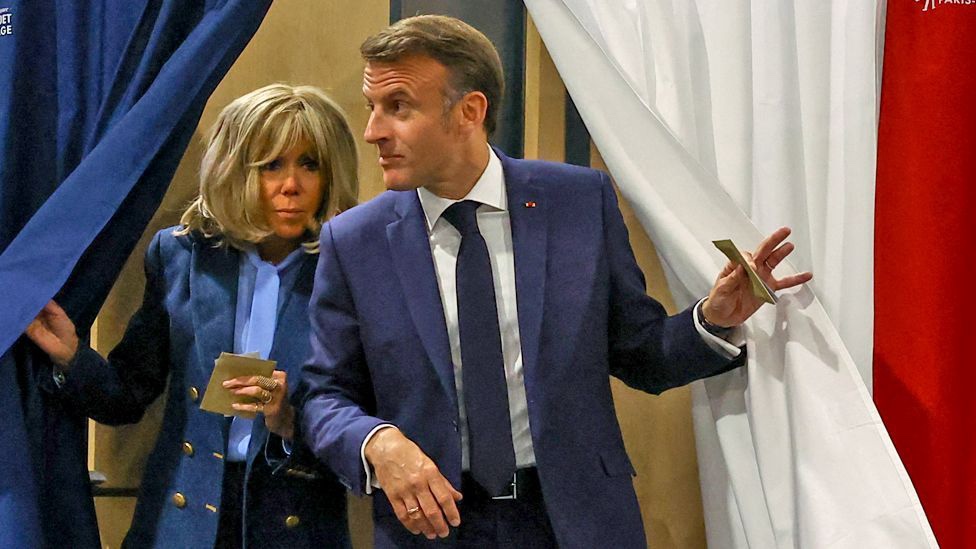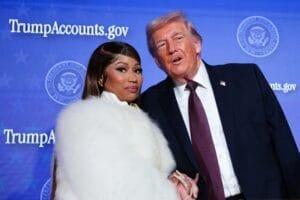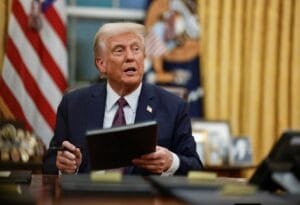Macron’s election gamble puts French democracy on table

Two neighboring countries have planned to commence elections that were called out of the blue.
Both have governments that are expected to fall.
In both countries, political tensions have divided families and friends.
Stop. At this point, all attempts to draw parallels between the British and French elections must cease.
Because however much might be at issue in the UK election — and there is much — it pales next to the stakes that have been raised across the channel.
Here in France, it is not just the fate of a government or a leader that is in the air – but of a political system.
And the risks are not of disappointed hopes and crushed careers, as in a peacefully functioning democracy, but of actual violence.
“The situations are very different,” says veteran French commentator Nicolas Baverez. “In the UK you are at the end of a political cycle. It was totally rational for Rishi Sunak to call an early election and everything is taking place in line with the UK parliamentary system.
“In France we are jumping into the unknown.”
Left-wing parties have formed an alliance — the New Popular Front — to stand up to the far right in the elections
President Macron astounded the country two weeks ago when he called the snap vote in reaction to his trouncing by the far right at the elections to the European parliament.
He appears to have thought that a lightning campaign would startle voters out of their flirtation with the “extremes”, and return a centrist majority to the National Assembly.
A week ahead of the first round, nothing suggests that his calculation was correct. The far-right National Rally (RN) is still way ahead in the polls, and now there is a left-wing alliance – whose main component is the far-left France Unbowed (LFI) – that is poised to come second.
The likeliest outcomes are either an outright RN majority – and so a far-right government – or a hung parliament that spells paralysis.
Either way, says Baverez, the risks are threefold: first, a crisis of France’s sovereign debt, as the markets defy the French government much as they did the UK’s erstwhile Prime Minister Liz Truss.
Second, violence on the street. And third, institutional collapse.
“Our Fifth Republic was designed to get us through crises. But we are in a very unstable situation. The citizens are lost because the president himself is lost, so we may have a brutal break-up of the institutions.”
Across France people are aware that the country is at a dangerous crossroads.
Jordan Bardella, 28-year-old leader of the far-right Rassemblement National (RN) party, could become France’s next prime minister
“When Macron called the election on the evening of the European elections, I called my children and said – you do realize we are living a historic moment,” says Juliette Vilgrain, a candidate for Horizons — a party allied to Macron – in the Seine-et-Marne department south of Paris.
“People know that violence is a possibility. People are angry and frustrated – and there are politicians who will call for violence. It’s manipulation, but that’s how it is.”
President Macron has himself even alluded to the possibility of “civil war” – saying this was the logical conclusion of the programs of the far right and the far left.
His words – in a podcast on Monday – have been interpreted as a bid to scare voters back towards the center, but according to Baverez that is deeply misguided.
“It’s very dangerous for him to use this word, and try to save his power by using fear. In a democracy when you play on fears, you give rise to hate and violence,” he says.
Macron’s Interior Minister Gérald Darmanin has said the authorities are working on the assumption that there could be violent protests on the evenings of the first and second rounds (June 30 and July 7).
The nightmare scenario would be an RN victory leading to calls from the far left for demonstrations, which then turn violent and are joined by people of immigrant origin from the banlieues.
The far-left LFI has a large support base in the banlieues and has made support for Gaza one of its main campaign themes.
How political instability might then affect the Olympic Games, which begin less than three weeks after the vote, is another of the questions that seem not to have been taken into account by the president.
For Baverez, however great the differences, there is one parallel that can be drawn between the French and UK elections.
“France is having its populist moment,” he says.
“The US and the UK had theirs ten years ago, with Trump and Brexit. France was spared then because of the strength of our institutions, but also because of the umbrella of the euro.
“Being in the euro meant that governments here could keep doing what they always do: buying social peace by increasing the public debt. Well, now it’s over.”















